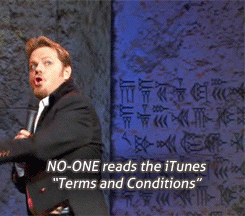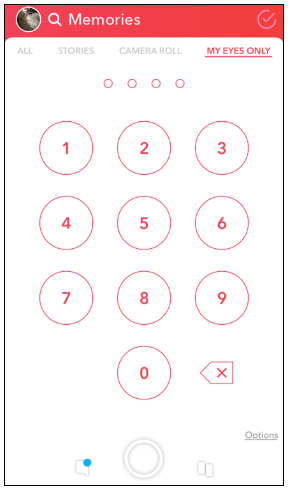Lauren Lemelin
Sneaky Snapchat: Exploring their Terms of Service
Snapchat, known as “Snap Inc.” has two terms of service; “Snap Inc. Terms of Service” and “Snap Group Limited Terms of Service." “Snap Inc. Terms of Service” is applicable to those living in the United States and “Snap Group Limited Terms of Service” is applicable to those living outside of the United States. For this assignment I explored the “Snap Inc. Terms of Service” as that is the most applicable to me. After reading through Snapchat's Terms of Service, I identified five terms that I thought were the most interesting and explained and discussed them below. |
| Really interesting facts about Snapchat. |
- “Who Can Use the Services” states:
- No one under the age of 13 is allowed to create an account or use Snap Inc.’s services.
- Notice how they state nobody under the age of 13 can use Snap Inc.'s services. This suggests that Snapchat may have issues with young users using their parents accounts.
- Children and underage users is a side-effect of social media that Vega-Castaneda and Castaneda (2019) addressed in their article.
- Snap Inc. also requires that:
- Users are not on the U.S. Treasury Department’s list of Specially Designated Nationals or face any other similar prohibition.
- Users are not a convicted sex offender.
- Users can form a binding contract with Snap Inc.
- Users will comply with these terms and all applicable local, state, national, and international laws, rules, and regulations.
- My thoughts:
- I think Snapchat has excellent rules and regulations for who can use their services, but unfortunately, I don't think they are able to enforce the rules. For example, they have made it very easy to lie about your age when you are making a Snapchat account. I also know many pre-teens that have an account and have not been caught.
 |
| Example of how you can lie about your birthday on Snapchat. |
- “Rights You Grant Us” states:
- When users create, upload, post, send, receive, and store content they retain ownership rights in that content but they also grant Snap Inc. a license to use that content.
- What does that mean?
- This means that any “non-public content” users submit to Snapchat can be hosted, stored, used, displayed, reproduced, modified, adapted, edited, published, and distributed by Snap Inc. and its affiliates.
- Any “Public Content”, story submissions that are set to be viewable by everyone as well as content submitted to “Our Story”, grants Snap Inc. and its affiliates the same rights for "non-public content" as well as a right to "create derivative works from, promote, exhibit, broadcast, syndicate, publicly perform and display public content in any form and in any and all media or distribution methods (Snap, 2019, par. 3)."
- This means that Snapchat can use your "public content" for marketing purposes. This is a perfect example of surplus labor, surplus labor is work that is performed unpaid (Fuchs, 2017).
- Snap Inc. also reserves the right and license to users name, likeness, and voice, in connection with sponsored content.
- This is an example of domination, domination is when one group (Snapchat) benefits at the expense of others (users) and has the power to uphold that situation (Fuchs, 2017).
- Snap Inc. can also access, review, screen, and delete users content at any time and for any reason.
- "The Content of Others” states:
- Content posted publicly or sent privately is the sole responsibility of the user or organization that submitted it.
- Snapchat does not-take responsibility for any content that users provide through their services as they cannot guarantee that all content produced conforms to their terms, guidelines, and conditions.
- “Respecting Others’ Rights” states:
- Users may not use Snapchat or enable anyone else to use Snapchat to:
- “Violate or infringe someone else's rights of publicity, privacy, copyright, trademark, or other intellectual property right (Snap, 2019, par. 7)."
- Bully, harrassess, defame, or intimidate users.
- Unfortunately, bullying occurs way too often on Snapchat. This often occurs when users screenshot content, that was intended for them only, and distribute this content to others.
- For example, in high school 30-40 boys had a group chat where they would store screenshots of embarrassing and intimate photos of women without their consent. This is similar to 8chan, an image-board site where women's intimate photos are often exposed (Salter, 2016).
- Spam or solicit users.
 |
| Examples of screenshotted snapchats. |
 |
| When people accidentally screenshot a snapchat. |
- “Memories” states:
- What is Snapchat memories?
- Memories is a data storage service that makes it easy for users to store photographs to reminisce on later.
- There is ability to restrict access to select memories in the "My Eyes Only" section through a passcode.
- If users lose or forget their "My Eyes Only" passcode or if they enter the wrong passcode too many times, they will lose access to any content saved in their "My Eyes Only."
- Snap Inc. does not offer any password recovery for this restricted area.
I was shocked to learn that Snap Inc. has the right to store, use, and distribute my content even if it was sent privately. I am surprised because this seems like an invasion of privacy. I am also surprised that users are not more aware of this term/condition. I have had Snapchat since seventh grade and I never knew they had that level of power and ownership. This is very disturbing and I am considering deleting my account because of it.
In the “Who Can Use our Services” Snap Inc. states that convicted sex offenders, people on the U.S. Treasury Department’s list of Specially Designated Nationals, or people who face other similar prohibition may not use their services. I am surprised by this because I didn’t know social media platforms could discriminate against individuals, even if it is for legal purposes. However, I think this a great rule as you don't want the platform to be used by dangerous people in inappropriate ways.
What do I think is missing?
In “Memories”, Snap Inc. discussed how the "My Eyes Only" section in memories can be locked through a passcode, however they never explicitly stated if the content in this restricted area is also subject to being hosted, stored, used, displayed, reproduced, modified, adapted, edited, published, or distributed. I think this is an important detail that they are missing as it could change users minds about using their platform to store secret, valued memories.
In “Respecting Others’ Rights” Snap Inc. laid out three rules that all Snapchat users need to abide by, but they never stated the procedures for when a user breaks these rules. Once again I think this an important detail that needs to be explicitly stated so that if these rules are broken (which they are) by users, Snapchat can respond in a fair and uniform manner. Also since it isn't stated it makes me question if they even monitor users, enforce rules, and punish those that break them.
Accessibility of Snap Inc.’s Terms of Service
I accessed Snap Inc.'s Terms of Service through their website (Click here to view their terms of service), as I found it easier to read online versus on the app. Though, their terms of service is the same on their website and on the app. I found it difficult to access it on the app so I have provided step by step instructions on how to do so if you are interested in reading it on the app. I feel like Snapchat makes their terms of service less accessible on the app, because they want users to focus on producing content and interacting with other users, not reading their terms of service.
Step One:
| Open up the app and click the circle in the top left hand corner. |
Step Two:
| Then click the item in the top right hand corner. |
Step Three:
| Scrollllll Doooown! |
Step Four:
| Click "Terms of Service" under "More information" |
Step Five:
| You successfully reached their Terms of Service. |
At the beginning of Snap Inc. Terms of Service it states “We’ve drafted these Terms of Service (which we call the “Terms”) so you’ll know the rules that govern our relationship with you. Although we have tried our best to strip the legalese from the Terms, there are places where these Terms may still read like a traditional contract (Snap, 2019, par. 1).” Snap Inc. is obviously aware that their terms of service is hard for an average person to read and therefore tried to make it easier to understand by "dumbing it down." However, I still found it very hard to read, in fact I read this article before writing my blog (Click here to read the article), it helped me better understand their terms of service.
Typically, do I read the terms/conditions?


Typically I do not read the terms and conditions for social media platforms because they are very long and hard to understand. Although when I get a notification about the terms of service being updated I will occasionally browse through it for a second. However, I have never read a terms and conditions in its entirety until now. Though after completing this assignment I realize that I need to be aware of the terms and conditions on every platform that I am using because the company may hold a surprising level of power, control, and ownership over you and your content.
References
Fuchs, C. (2017). What is a critical introduction to social media? In C. Fuchs (Eds.), Social media: A critical introduction (pp. 1-26). London: SAGE Publications Ltd.
Islandkit. (2017). Snapchat Terms of Service. TldrLegal. https://tldrlegal.com/license/snapchat-terms-of-service
Salter, M. (2016). Introduction. In M. Salter (Eds.), Crime, Justice and Social Media: New Directions in Critical Criminology (pp. 1-11). Routledge.
Snap Inc. (2019, October 20). Terms of Service. Snap Inc. https://www.snap.com/en-US/terms
Vega-Castaneda, L., & Castaneda, M. (2019). Teaching and learning about difference through social media. Women and Girls and Social Media, 86–103. doi: 10.4324/9781351238212
Islandkit. (2017). Snapchat Terms of Service. TldrLegal. https://tldrlegal.com/license/snapchat-terms-of-service
Salter, M. (2016). Introduction. In M. Salter (Eds.), Crime, Justice and Social Media: New Directions in Critical Criminology (pp. 1-11). Routledge.
Snap Inc. (2019, October 20). Terms of Service. Snap Inc. https://www.snap.com/en-US/terms


No comments:
Post a Comment
Note: Only a member of this blog may post a comment.